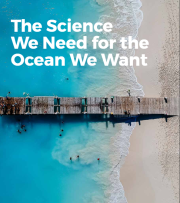“Advancing Ocean Knowledge, Fostering Sustainable Development from the Indo-Pacific to the Globe”, as this slogan goes, has been the mainstream of deliberations among the WESPAC Advisory Group and some invited outstanding scientists from the region.
The three-day WESTPAC meeting held in Qingdao, China on 28-30 November 2016, which brought together its scientific advisory body and some outstanding scientists from the region, reviewed the preparations for the upcoming 10th WESTPAC International Scientific Conference ( 17-20 April 2017), examined its deficiency in delivery to address marine scientific challenges, and brainstormed a number of actionable suggestions towards a more dynamic regional subsidiary body of IOC/UNESCO over the next 2-5 years.
The preparations for the 10th WESTPAC International Scientific Conference is in full swing. It is said that the number of abstract submission reached a new peak with some 700 submissions from 25 countries within and outside the region. The meeting came out a series of conclusions, respectively on an important timeline for all subsequent processes, the selection of WESTPAC Outstanding Scientists and WESTPAC Best Young Scientists presentations, and abstract review to be conducted by designated session conveners.
In addition, the meeting intensively reviewed existing WESTPAC programs and activities which were initiated earlier to address the region’s three major scientific challenges, namely ocean processes and climate, marine biodiversity and seafood security, and ocean ecosystem health. It was strongly recommended that an integrated and multi-disciplinary approach be adopted and further strengthened to the development and implementation of WESTPAC programs.
The meeting emphasized on the essential of the WESTPAC capacity building mechanisms mainly through the WESTPAC initiated “IOC Regional Network of Training and Research Centers (RTRC initiative) ” with early-career scientists as its main beneficiaries. In doing so, the meeting expressed its great appreciations to the host countries of RTRC-ODC (SOA and its FIO, China) and RTRC-MarBEST (LIPI and its RCO, Indonesia), and recommended intensifying efforts in setting up more RTRCs on other specialized areas in view of strong willingness received from several member states. Having said that, the meeting also considered the possibility for WESTPAC to leverage grand opportunities in higher education.
Responding to emerging challenges, the meeting decided to initiate efforts in combating marine micro plastics and marine deoxygenation, and to develop an appropriate mechanisms for assisting countries in the implementation of the Sustainable Development Goals, particularly its SDG 14.




